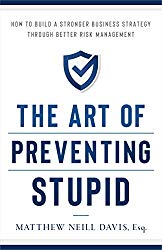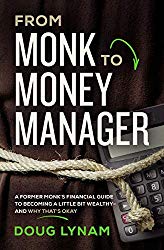“Money is not the root of all evil. Money is the root of everything, good and evil. Ignoring half the truth blinds us to the truth.”
From Monk to Money Manager: A Former Monk’s Financial Guide to Becoming a Little Bit Wealthy – And Why That’s Okay
Doug Lynam used to be a monk, and he’s now a financial advisor. He’s a sort of unicorn to most people, but that’s what makes this book so important. For too long religion and money have been held separate. But as Lynam says, “The cold, hard truth is that in this modern life we need money. We can’t live our lives and serve others without it.”
Lynam joined a monastery, in part, to escape the world of money and ended up spending more time worrying about money than almost anyone in the outside world because the monastery was going broke – and he had to fix it. Another irony, directly related to the first, is that he learned he is good at helping people with their financial problems.
The lessons Lynam learned as a monk made him realize that the most powerful way for him to have an impact in the world was to leave the monastery and advise people about their finances full time.
What makes this book different is Lynam’s unique background and experiences that have brought him to where he is today and the helpful mindsets he shares. This is a different kind of ‘financial book’ because of the connection of money problems to the personal and spiritual components. Lynam helps people uncover what those are to avoid them all getting tangled together.
Lynam wrote From Monk to Money Manager: A Former Monk’s Financial Guide to Becoming a Little Bit Wealthy – And Why That’s Okay (Thomas Nelson, March 26, 2019) as a mass-appeal book intended to hook adults of all ages, religions, and political persuasions because the discussion of ethics and money impacts you regardless of your beliefs. He believes the lack of money is the key driver for most of the suffering in the world, and if we can face that problem squarely, honestly, and with good minds and hearts we can mitigate some of the worst problems in the world.
More specifically, the book is aimed at anyone who wants to learn how to become wealthy while remaining an ethical person. Even more precisely it helps anyone who wants to:
• Retire on time and with dignity
• Live debt free
• Pay for college
• Stop living paycheck to paycheck
• Afford quality healthcare
• Own a home
• Start a business
• Conquer their emotional money baggage
Doug Lynam, author of From Monk to Money Manager: A Former Monk’s Financial Guide to Becoming a Little Bit Wealthy – And Why That’s Okay, is Director of Educator Retirement Services at LongView Asset Management in Santa Fe, New Mexico, is a self-proclaimed Suffering Prevention Specialist.





